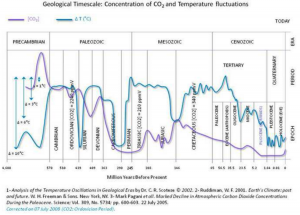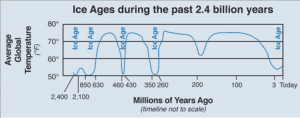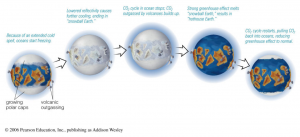Response to David Roberts’ “The Decisions We Make About Climate Change Today Will Reverberate for Millennia. No Pressure”:
Let me be clear that I completely agree with the emphasis Roberts (and many scientists) is making, “this long-term view shows that the next few decades offer a brief window of opportunity to minimize large-scale and potentially catastrophic climate change that will extend longer than the entire history of human civilization thus far. Policy decisions made during this window are likely to result in changes to Earth’s climate system measured in millennia rather than human lifespans, with associated socioeconomic and ecological impacts that will exacerbate the risks and damages to society and ecosystems that are projected for the twenty-first century and propagate into the future for many thousands of years.” I think that the issues and facts he provided should be kept at the forefront of politics, both international and domestic, for the sake of next few generations of humans, the fauna that is currently suffering physical pain and starvation, and the current generation of poor and low-lying nations. We, as privileged citizens of the United State especially, should use the democratic power we have to ensure that these beings and the generations after them don’t suffer any more than our consumerism and blind law-making (or lack thereof) have caused already. However, it’s a shame that Roberts didn’t give the Earth or human innovation credit where due.
I truly appreciate the fact that popular websites like Vox and authors like David Roberts are attempting to give climate change and the political process’ impact on the environment the gravity that these topics deserve. However, I think there are a few flaws with Robert’s wording that is common throughout the human-centric timescale climate change effects are seen through. For one, the “Climate Change is, for all intents and purposes, Forever” subtitle, completely fails to take the geological timescale of the Earth and its incredible coping abilities into account. These “intents and purposes” are completely human-centric—which, I suppose, is appropriate as there are no sloths or bacteria or algae reading online Vox articles. Roberts quickly covers the non-human areas in which the effects will be felt saying, “such a large, rapid change in the Earth’s climate should be expected to radically reshape its flora and fauna as well, most notably through a rise in the rate of extinctions”. However, this article fails to recognize the fact that various massive factors (from tremendous climate change to impact events) throughout the earth’s history have caused mass extinctions such as The Great Dying— in which 96% of all species died out. The flora and fauna need not worry about climate change in the longterm, considering the biodiversity the Earth holds today (and even before climate change knocked a dent in it) all came from the 4% of species that persisted somehow through that Permian mass extinction. In the Late Devonian Mass Extinction (even before The Great Dying) 3/4 of all Earth species died out and most reefs were destroyed due to the shallow sea levels. However these reefs managed to return to their former glory in completely natural circumstances 100 million years later. To say that the effects of climate change will last forever is completely absurd when looking at the Earth with it’s full history. Yes, the effects will last millennia, yes it will effect millions of humans, and yes it will change the Earth as we know it- but how we know the Earth is such a small portion of what it has been– and the wording “forever” just is not correct. This isn’t to say that human-centric problems are not of importance or should be ignored, as the “it’s just a cycle” rhetoric seems to imply. While I agree that studies and scientific data should show the predicted C02 levels past 2100, to say that they will “never” lower goes against all data of Earth cycles.



If reefs can regrow to populate the ocean, humans can come from the same organisms that survives “snowball Earth”, and today’s earth species can grow from a mere 4% survival— there are no limits to the regenerating power of the Earth. All of these regeneration happened without the aid of technology as well! Roberts touches on green technology saying, “there are long-term drivers involved that probably make a global clean energy transition inevitable on some timescale”. With hopeful human innovations and solutions to lessen the impact of climate change (from solar panels to iron fertilization), and an ever-growing green technology field (hopefully pushed by policy and the increasingly visible effects of climate change), who is to say that the pairing of positive human innovation and the Earths amazing recovering abilities cannot lead to a solution to, or lessening of, the mistakes made in the anthropocene thus far.
